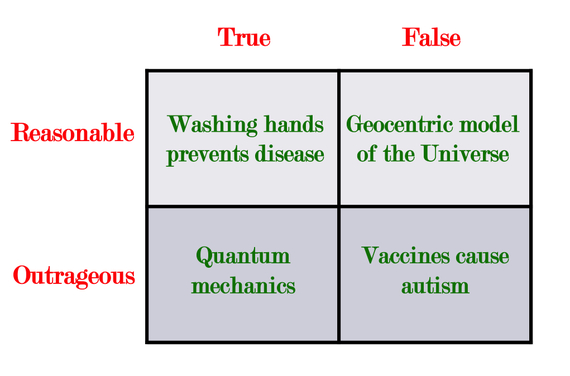I met an installation artist at a dinner party a couple of months ago. When she asked what I did, I told her I was a physicist.
"I love physicists," she gushed. "I work with a tribe in the Amazon and they are more quantum mechanical than us."
"What do you mean?" I asked.
"Quantum mechanical, you know...more spiritual, less materialistic than the Western world. "
Physicist Wolfgang Pauli's phrase came to mind: "That's not even wrong." I had the decency not to say it, but instead pointed out that she was using the words "quantum mechanical" inappropriately.
"They're not your words," she said. "I can use them as I please."
Of course. In her eyes, science is rife with outrageous ideas, so why wouldn't her outrageous analogy be equally valid?
Once I overcame my frustration, I started to think about the misuse and misunderstanding of scientific ideas. What distinguishes an outrageous idea from a reasonable one? And how are these different from a true or a false idea? I suspect that many people confuse reasonable/outrageous with true/false, which contributes to difficulties they have in understanding the sometimes counterintuitive scientific findings.
To address this confusion, I offer pragmatic definitions (quibblers, you have been warned!) of the words reasonable, outrageous, true and false as they apply to scientific ideas.
An idea that I find reasonable is one that fits with my perceptions and current knowledge. An outrageous idea doesn't agree with my perceptions or preconceived notions of reality i.e., current theories of the natural world. (The word current is key: an outrageous idea can become reasonable over time.) A true idea has been thoroughly tested and agrees with available evidence. Note that scientific truths are provisional and can be upended by new evidence. A false idea is one where theory and reality don't agree. That is, the phenomenon being studied can be explained by a different concept than the one proposed or it cannot yet be explained.
By combining the reasonable/outrageous categories with the true/false one, we can gain insight into how science works (see table below).
And this is where confusion sets in for many people. They claim to have proven an idea is false, when all they've shown is that it is outrageous (for them, because the reasonable/outrageous categories are subjective ones). Or, as I once heard a fanatic yell out in the subway, "If evolution is true, why don't you ever see a woman give birth to a goat?"
Some comments about the examples I chose:
1. Reasonable and true: washing your hands prevents disease. Today, this idea is reasonable because it fits with our common sense, but this was not always the case. In 1847, the Hungarian physician Ignaz Semmelweis discovered that postpartum infections could be greatly reduced by using hand disinfectants during the delivery of babies. Alas, his claim was initially rejected by most doctors in part because it didn't fit with contemporary scientific theories i.e., it was considered outrageous.
2. Reasonable and false: the Sun and planets orbit the Earth. The geocentric model is dismissed today, but for over 1500 years it predicted all observable astronomical phenomena with acceptable accuracy. And it is reasonable: the Earth doesn't seem to be moving and when you look up in the sky, you do see all other celestial bodies go around. It wasn't until 1610, when Galileo Galilei observed the moons of Jupiter and the phases of Venus, that the geocentric model was challenged by observations it could not explain and was eventually replaced by a heliocentric model.
3. Outrageous and true: quantum mechanics. Energy can change only in discrete amounts? Matter is both particles and waves? Measuring a particle's position affects how well you can determine its velocity? As physicist Niels Bohr, a pioneer of quantum mechanics said, "If you can understand quantum mechanics without getting dizzy, you haven't understood anything about it." Yet despite the outrageous claims, quantum mechanics is true--it's the most precisely tested theory in science with an accuracy of about one part in a billion (for the electron's anomalous magnetic dipole moment).
4. Outrageous and false: vaccines cause autism. To suggest, as the former British physician Andrew Wakefield did in 1998, that the measles, mumps, rubella vaccine was not safe based on a study of only 12 children when millions had been vaccinated without any harm is outrageous. And then it turned out the claim was based on unethical medical practices and fraudulent science.
What examples would you choose for the table above? Are you sure that the reasonable things you believe in are true and that every outrageous idea you abhor is false?
Note: This article was adapted from a talk I gave at The Amazing Meeting (TAM13) in Las Vegas on July 19, 2015.
